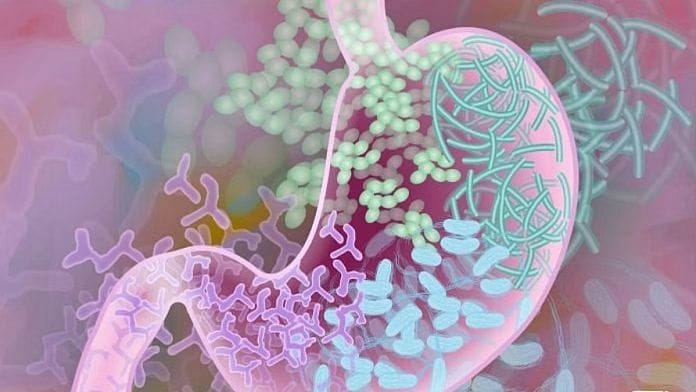Neurotransmission is the process by which neurotransmitters are released from one neuron and travel across the synapse to transmit signals to another neuron or a target cell. This process is essential for communication within the nervous system and between the nervous system and the rest of the body.
The Synthesis of Neurotransmitters: The Role of the Brain, Central Nervous System and Gut
Neurotransmitters are synthesized primarily in the brain and the central nervous system (CNS), but the gut also plays a significant role in their production, highlighting the importance of the gut-brain axis.
- Brain: The brain is the primary site for the synthesis of many neurotransmitters. For example, dopamine is synthesized in the substantia nigra and the ventral tegmental area, serotonin is synthesized in the raphe nuclei, and acetylcholine is produced in various regions including the basal forebrain.
- Central Nervous System (CNS): Beyond the brain, neurotransmitters are also synthesized in other parts of the CNS including the spinal cord. The CNS is responsible for coordinating the release and action of these neurotransmitters, ensuring that they are available where needed for the communication between neurons.
- The Gut: The gut, often referred to as the ‘second brain’, is home to the enteric nervous system (ENS), a network of neurons embedded in the lining of the gastrointestinal system. This system is capable of producing neurotransmitters such as serotonin, which is predominantly synthesized in the gut; about 90 per cent of the body’s serotonin is found here.
- The Influence of Gut Microbiota: The gut microbiota—the trillions of microorganisms living in the digestive tract—also play a critical role in neurotransmitter synthesis. These microbes can produce, modify and influence the levels of neurotransmitters like serotonin, dopamine and GABA. For example, certain gut bacteria can produce short-chain fatty acids (SCFAs) that influence the production of neurotransmitters in the CNS. Now that we have established the basic role of the brain and the gut in the production of neurotransmitters, let’s try to understand how they interact with each other, and further expand on the role of neurotransmitters in affecting our mental health and overall well-being.
The Gut-Brain Axis: A Two-Way Street
The gut-brain axis refers to the constant bidirectional dialogue between the enteric nervous system (ENS) located in the gut, and the central nervous system (CNS), which is primarily the brain. This connection allows the gut to influence brain function and vice versa, playing a crucial role in the regulation of neurotransmitter levels and consequently in our mental health and well-being. This communication occurs through various pathways, including the vagus nerves, neurotransmitters, hormones and immune system molecules. Simply put, signals travel from the gut to the brain and vice versa.
For instance, What happens when we experience butterflies in our stomach? It is the stress or nervousness that is impacting our gastrointestinal functions, leading to symptoms like abdominal discomfort. In extreme cases, stress has been shown to cause diarrhoea or vomiting.
Conversely, disturbances in gut microbiota composition—known as gut dysbiosis—adversely influence brain function and behaviour by downregulating neurotransmitters and producing inflammatory molecules. Located in the gut, the ENS comprises 50–100 million nerve cells—as many as there are in our spinal cord—which empowers the gut to actually outclass all the other organs in terms of functional capabilities, and match the brain’s performance.
How Does the Gut Influence Neurotransmission?
- Neurotransmitter Production: As mentioned earlier, the gut is a significant site of neurotransmitter production. For instance, the gut microbiota can produce the precursors to neurotransmitters, such as tryptophan for serotonin synthesis.
- Immune System Interaction: The gut is a major player in the immune system, which can impact neurotransmitter levels and function. Inflammatory responses in the gut can influence the brain, leading to changes in neurotransmitter production and signalling.
- Vagus Nerve: The vagus nerve is a key component of the gut-brain axis, providing a direct line of communication between the gut and the brain. It helps transmit signals related to the gut’s environment, which can affect neurotransmitter production and release.
How Does the Brain Influence the Gut?
- Stress Response: The brain’s response to stress can influence gut function, leading to changes in the gut motility, gut permeability and neurotransmitter release in the gut.
- Hormonal Signals: The brain can send signals through hormones like cortisol that affect the gut’s environment and its ability to produce neurotransmitters.
We often see people emphasizing paying attention to one’s ‘gut feeling’ while making decisions or dealing with certain situations. This expression is not just randomly made up. A healthy gut is considered to make the brain more agile and cognitively enhanced. The gut can influence our emotional responses to pain, happiness, failure or success. It also plays a role in how we interact socially and even guides many of our decisions. When ‘Sarah’ hung out with her colleagues for dinner or lunch, and attended office parties, it was her decision to project a fancy version of herself in front of her colleagues and on social media.
Eventually when she felt lonely and became disappointed, she decided to isolate herself. It was her ‘gut feelings’ sending wrong signals to the brain, causing her to make poor decisions. Neurotransmitters such as serotonin, dopamine and GABA are primarily synthesized in the gut and exert a profound effect on mood, cognition and behaviour, which is why it’s a no-brainer that the gut is often referred to as the ‘second brain’.
The gut houses millions of neurons and harbours trillions of microorganisms that regulate digestion, nutrient absorption and immune function, influencing our overall health. Approximately 90 per cent of the body’s serotonin—a neurotransmitter involved in regulating mood and appetite—is produced in the gut. Similarly, hormones like cortisol and ghrelin which modulate our stress response and appetite are influenced by gut microbiota activity. Disruptions in this activity have been linked to various physical and mental health conditions including obesity, inflammatory bowel disease, depression and anxiety.
The Mind-Body Connection: Exploring the Intensity of the Gut-Brain Axis
Mounting evidence suggests that disturbances in the gut-brain axis are linked to various psychiatric disorders, including depression, anxiety and autism spectrum disorders. The gut microbiota composition has been found to differ between individuals with mood disorders and healthy controls, highlighting the potential therapeutic implications of targeting gut health in mental health interventions.
However, when we talk about mental health, we use a term that is loosely interchangeable with the brain, the heart, or at times, even the gut. It is the mind. The mind, as we know, does not have a physical existence. However, it is integral to the body—the essence of our being. It is the home of our consciousness, including our emotions, feelings, cognition and thoughts, but cannot be confined to just the brain or the gut alone, although it is very well connected to them both.
Simply put, the mind is much more than what happens in our gut or brain. However, our gut and brain can definitely shape the mind.
 This excerpt from Manjari Chandra’s ‘Brainwashed by Your Gut: The Secret Link Between Food and Mood’ has been published with permission from Rupa Publications.
This excerpt from Manjari Chandra’s ‘Brainwashed by Your Gut: The Secret Link Between Food and Mood’ has been published with permission from Rupa Publications.






